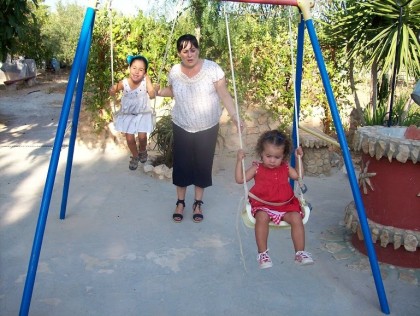Judge Not, and Construct Not, Either.
Devra Torres | Aug 6, 2012 | 5 cmts
When I just had two (and then three, and then five..) little kids, we lived in Barcelona. Expatriate life was plenty challenging, and I had not been raised to suffer in silence (What? Then how are people supposed to know you're suffering?).
But I began to notice something odd. People admired me and looked askance at my husband. (He took to calling us Saint Dev and Mad Max.)
Now, I might not have minded (which goes to show how saintly I really am) if they had admired me for my talents or beauty or intellect. But it wasn’t that. They saw that I had “a lot” of kids—in Spain three counts officially as a “familia numerosa” and gets you a 15% discount on the subway—

and that I spent a lot of time with them.
I did. I’d drop one off at nursery school, walk down a picturesque village street,
pick up some bread from the bakery,

stop for Mass at a majestic old church,

spend a little time at the playground with the little ones,

and walk home in the fresh air. Yes, I changed diapers and did some mundane and occasionally very hard or disgusting jobs. I suffered from culture shock. I wasn’t a full-time bon-bon-eating slacker. But I was my own boss, setting my own schedule. I got lots of time outside,and I got to spend nearly 24 hours a day with my kids, which was precisely what I’d been hoping to do since before they were born.
My husband, who made all this possible, had to put on a suit every day (it wasn’t a suit-friendly climate), get to work on time, spend hours and hours each day sitting in an office,

and keep enormous numbers of colleagues and bosses and students happy with his performance. Oh, and earn a PhD. He had to finance all the diapers I changed, all the groceries I selected, and all the strollers I wore out on those picturesque cobblestones. On him fell pretty much all the paperwork

and all the big-picture worries attendant on charting our course

—because even if I’d had his natural bent for big-picture thinking, I was hopelessly, and not so unhappily, mired in the details of bearing, feeding, changing and reading stories to the babies.
(Besides, being the eldest of eight, I had some inkling of what I was getting into by having all these kids. My husband was the baby of two, and deserves a hefty amount of credit for sheer bravery.)
Yet people made hilariously unfounded judgments, good and bad, about us both. They assumed I’d rather be working at a prestigious job but was being sweetly longsuffering about it. They assumed my brutal husband had pressured or forced me to forego birth control--or that most of the kids were “accidents,” but I was heroically being nice to them anyway. They had formed a wholly imaginary picture of my life.
This reminded me (strangely enough) of an epistemology class in grad school on “construction.” Some contend that much of what we mistake for objective reality is actually “constructed”—by prejudiced individuals or by society at large.
(Ivy Leaguers are notorious for getting exceedingly carried away with this idea. When my husband was at Harvard, we ran into people who truly believed that every single difference between good and evil, beauty and ugliness, and--above all--men and women is merely “constructed,” none of them real or innate.)
Now, the mind indulges in legitimate “construction” all the time. Lots of it is mixed into what we think of as just plain perception. Think, for example, of a sofa and chairs that partially obscure a rug.

All you’re literally seeing is the exposed part of the rug: an irregular swath of red.
You then take your knowledge of rugs, furniture, and three-dimensional objects and use it to construct something besides what you actually see: the hidden portion of the rug. You know--at least, you instantly assume--that the full rectangle is there, and you interpret what you do perceive in light of that.
You see what you expect to see.

Now consider what happens when it’s not just a sense impression, but the state of someone’s mind, argument, or soul that you're interpreting.

Lots of “constructing” goes on here, too—perhaps so reflexively that we don’t realize we are interpreting, rather than just receiving data. But here are some of the factors that can easily interfere with even the most well-intentioned perceiver:
- Projection: As Caryll Hauslander says, “We usually judge people by our own reactions, fears and desires….we attribute to them motives which we would have in the same circumstances.”
- Our own defects: As Jacques Philippe and Michel Esparza note, what aggravates us most about ourselves is what we’re most prone to detect, and least able to tolerate, in others.
- Our "investment" in the person we’re criticizing. We may exaggerate the flaws or strengths of our own child, or student, because we care so deeply about how they turn out. If we’re passionately concerned about a child's honesty, we may agonize over every toddler fib, or else twist ourselves in knots trying to explain away a baldfaced lie.
- On the other hand, love can give us insights into someone's character than no disinterested stranger would ever discover. So indifference can lead to distortions, too.
- A possible sense of responsibility for the moral upbringing of the person in question. We not only feel strongly--we feel responsible. Our judgment can be further clouded by the belief that the presence of bad traits is evidence of our own failure or defective genes. The object of our criticism then gets the brunt of our frustration with his own actual flaws, plus our frustration with our own perceived failure to eradicate or prevent them.

Well, then, is there hope for rational converstion? I think here is, as long as we watch out for:
- The danger of taking our own impressions of other people's virtue, viciousness, motivations, and intentions at face value, but also
- the danger of appointing ourselves Psychoanalyst in Chief, attributing ominous complexes of projection, anxieties, and defense mechanisms to people who are just trying to get through the afternoon, or have a conversation with us.
So next time you see a young mother running errands with her kids, remember:
Everything you know is wrong.



Comments (5)
Marie Reimers
Aug 7, 2012 9:51am
Well said, Devra. I catch myself at it frequently, to my shame. But I also run into folks who say they won't really into a conversation with me about something serious because they know I am a Catholic or a "non-Democrat" and thus already "know" how I will respond to something or argue a point. In other words, we can be assigned "scripts" and not be worth the trouble or argument.
But I do that, too. I now have the expectation of turning on the evening news expecting to hear a lot of left wing hooey, although I am always disappointed when I do.
With most of my kids, I am often correct about their positions on things, but sometimes surprised to find out that what I expect and the reality are two different things. These can be either pleasant surprises or horrible disappointments.
In my own professional life, it is a constant, especially since I work in social services - but, again, sometimes I am very pleasantly surprised.
Thanks Devra for another well written blog about our fallible human condition.
Devra Torres
Aug 7, 2012 6:19pm
Marie, thanks so much for taking time to comment.
It's so easy to talk past each other! and then it's so easy to misunderstand, even in that rare thing, a conversation between two people of good will and open mind (but not, like my mother says, so open that your brains fall out. I guess that was a paraphrase of Chesterton saying that the mind is like the mouth--you open it, but then it's meant to close on something solid!).
I'm glad there are people like you in social services! That should serve to correct certain stereotypes right there!
See you soon, right?
Michel Esparza
Aug 8, 2012 5:38am
Yes, ideed, Devra's article illustrates our fallible human condition. As christians we know that it comes from original sin, but by reason we have an intuition of it (St. Thomas Aquinas and Car. Newman, in Apologia pro vita sua, said).
If we realised how true that is, it would be much more easier to be receptive for grace...
PS: Devra, tomorrow we celebrate our "good old friend" Edith Stein...
Katie van Schaijik
Aug 8, 2012 8:11am
Devra, I've been thinking about this and wondering where to pinpoint the wrong in "constructing."
As you pointed out in the rug example, it does seem to be a feature of human intelligence that we "see" more than we see.
I also wonder whether and to what extent this ability to "read into" others' minds is linked to sympathy and empathy.
As I said in my own post the other day, I hate it when others project thoughts and feelings and motivations into me that aren't mine. And, like Marie, I'm very aware that I do this myself all the time.
But I can't quite see the principle yet that indictates where and when exactly it's wrong.
Devra Torres
Aug 8, 2012 12:46pm
Yes, Fr. Michel: I think maybe a big part of the spiritual life is trying to realize, and not just technically believe, the truths of faith.
And Happy Edith Stein Day in advance, everyone! I was going to do my dissertation on Edith Stein and Personalism, but maybe I'll just blog about her instead.
Katie, it's a really interesting question. Even with sense impressions, it's not so straightforward as it may seem. I think constructing, judging, and even projecting, to some extent, are inevitable as we communicate with other human beings, and most especially if we're in any kind of position of authority at all: mother, father, teacher, judge, administrator, manager, priest... Sometimes we have to act on the limited information we have. I don't know the answer regarding where to draw the line. I think a good first step would be in the direction of training ourselves to think of our assumptions about what's going on inside other human beings as just that: assumptions, or working hypotheses, or educated guesses. But of course if real empathy is going on (about which Edith Stein has plenty to say!) there's something more in play than just hypothesizing.